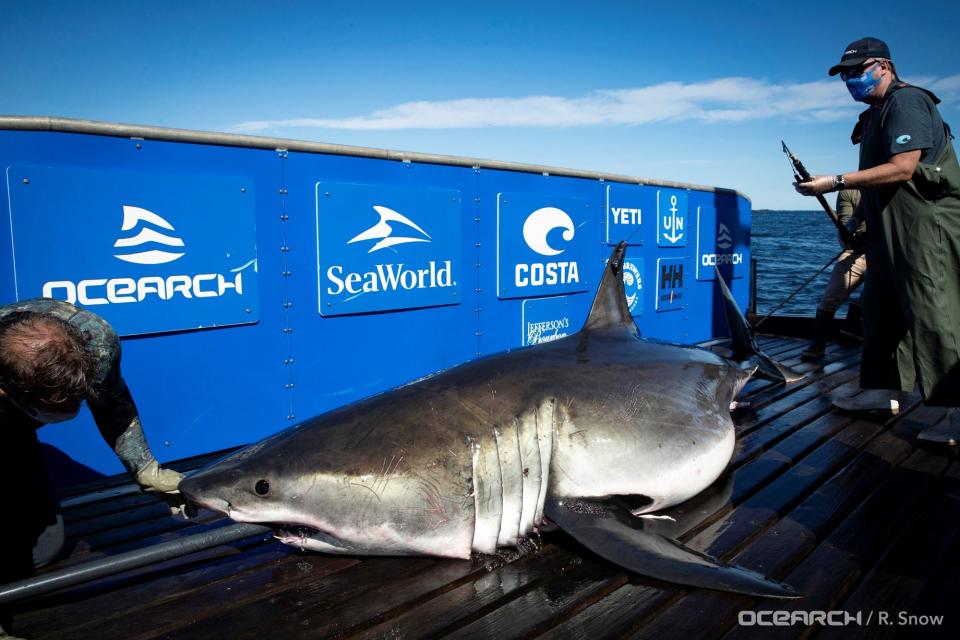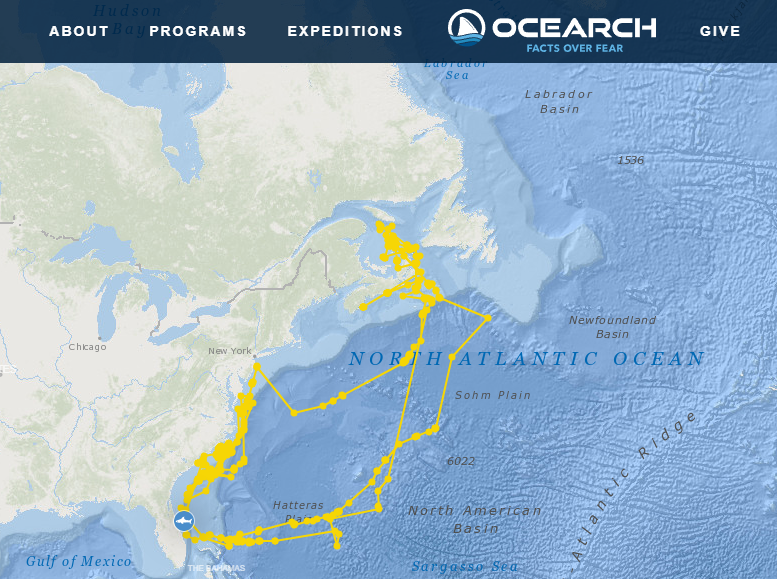Massive great white known for its shark 'drawing' pings in Florida just after Shark Week
A massive great white shark, known to be somewhat of an "artist," paid a rare summer visit off the Palm Beach County coast − just one day after Discovery Channel's 'Shark Week' ended.
The 13-foot, 3-inch, 1,437-pound shark, nicknamed Breton by the OCEARCH scientists who tagged it, pinged far south of Juno Beach at 12:12 a.m. Monday, July 15.
A satellite tag was attached to Breton's dorsal fin in 2020. The tag sends a ping with location information to OCEARCH trackers when it breaks the water's surface.
It's unusual for great white sharks to be this far south this time of year. The animals typically migrate north in the summer and south in the winter.
"The sharks spend summer and fall primarily in coastal waters off New England and Atlantic Canada, feeding on high-calorie prey such as seals, before heading back south to warmer winter waters off the southeast U.S. from South Carolina to the Gulf of Mexico," an OCEARCH study found.
According to his tracker, Breton left Florida in March and headed north, pinging off North Carolina's Pamlico Sound on April 18. The North Carolina coast is thought to be a mating area for North Atlantic great white sharks.
Breton then made a U-turn and headed back to the Sunshine State, where it pinged off the Fort Pierce coast on July 3, a day before July Fourth, before popping up off Juno Beach.
Here's what to know about Breton, OCEARCH and great white sharks in Florida:

More about OCEARCH great white shark Breton
Breton was the first shark tagged during OCEARCH's 2020 expedition in Nova Scotia, the group reported. At that time the adult shark was 13 feet, 3 inches long and weighed in at a whopping 1,437 pounds. Breton was named by SeaWorld, an OCEARCH partner, for the people of Cape Breton where it was tagged.
Here are some of the Florida spots Breton pinged from over the winter:
Jacksonville, Dec. 21, 2023
Flagler Beach, Jan. 2, 2024
New Smyrna Beach, March 10, 2024
Great white shark Breton made 'self portrait' of a shark on OCEARCH tracker
Breton spent a little over two years making a "self-portrait." Its pings between September 2020 and January 2022 connect to show what appears to be the outline of a huge shark, with the tail in Nova Scotia, the body along the east coast and head pointed at Florida's east coast.
"You can track Breton, the white shark that made this self-portrait on the OCEARCH Global Shark Tracker," the research group posted on X, formerly Twitter.

What does OCEARCH do for great white sharks?
OCEARCH is a nonprofit research organization studying the ocean's giants.
The group studies keystone species, including great white sharks, essential for the health of the oceans.
"At OCEARCH, we’re on a mission to solve the Global White Shark Puzzle. There are nine populations of white sharks across the globe and OCEARCH’s goal is to assist regional scientists to better understand the life of the white shark in each of these populations," the group's website states.
During the expeditions, researchers collected previously unattainable data on the animals' migrations, reproductive cycle, genetic status, diet, abundance, and more.
"If we lose the apex predator (sharks) then we lose all our fish and then there are no fish sandwiches for our grandchildren," OCEARCH founder Chris Fischer told the Courier Journal. "That's oversimplified, of course, but the idea is important because many shark species are threatened by overfishing and a demand for shark fins in Asia. Their dwindling numbers jeopardize ocean habitats."
How many sharks has OCEARCH tagged?
According to its tracker, OCEARCH has tagged 371 sharks, including 123 great white sharks.
123 great white sharks
144 tiger sharks
9 blacktip sharks
29 shortfin mako sharks
25 blue sharks
18 hammerhead sharks
6 silky sharks
6 bull sharks
8 whale sharks
3 great hammerhead sharks
The group has also tagged alligators, dolphins, seals, swordfish and turtles.
White shark facts
Here are some things to know about white sharks, according to NOAA Fisheries:
White sharks grow slowly. Males mature at around 26 years old and females at around 33 years old. Life expectancy is difficult to determine but is estimated to be between 30 and 70 years.
White sharks are about 4 feet long at birth but can grow up to about 20 feet long and weigh over 4,000 pounds.
White shark eat an opportunistic diet of fish, invertebrates and marine mammals.
White sharks are partially warm-blooded and can maintain their internal body temperature above that of the surrounding water. This allows them to be more active in cooler waters than cold-blooded species.
Great white sharks in Florida
Great white sharks migrate south when the water gets cold and food sources become scarce up north, according to OCEARCH chief scientist Dr. Bob Hueter.
Think of them as the snowbirds of sharks.
Most of them tend to stay away from the beaches in continental shelf waters, Hueter said.
5 shark attacks in Florida this summer
Florida has seen several shark bites this summer:
June 28: Man bitten near Fernandina Beach
July 8: Third bite in Volusia County
Most shark attacks happen in Florida
There were 69 documented unprovoked shark attacks around the globe in 2023, according to International Shark Attack File. The U.S. led the world with 36 attacks and Florida again was the state with the most bites at 16, none of which were fatal. A great white shark has not been identified in a Florida shark bite since 1926.
Florida shark attacks in 2023:
Florida: 16 bites, none fatal
Hawaii: 8 bites, 1 fatal
New York: 4 bites, none fatal
California: 2 bites, 1 fatal
North Carolina: 3 bites, none fatal
South Carolina: 2 bites, none fatal
New Jersey: 1 bite, none fatal
While the U.S. has the most attacks, South Africa has the most shark-related fatalities.
Support local journalism by subscribing to a Florida news
This article originally appeared on Fort Myers News-Press: 1,400-pound great white shark has rare summer ping off Juno Beach, FL

